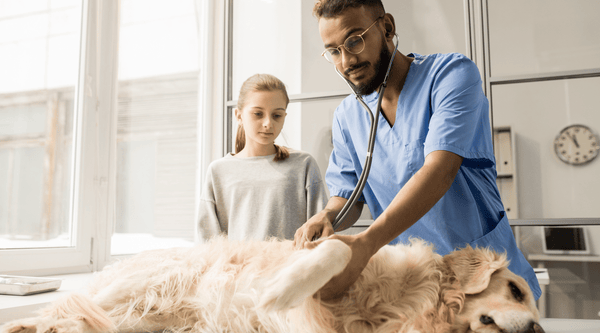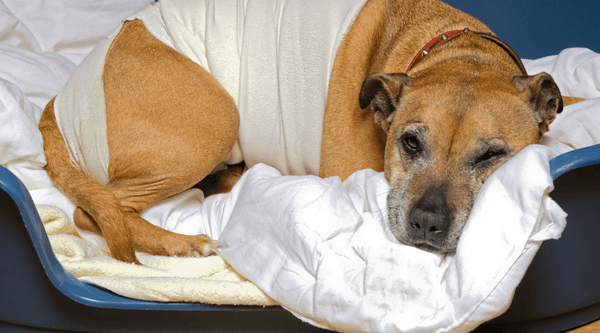Foreign bodies are items that originate outside the animal's own bodily systems. Large or irregularly-sized items may become lodged somewhere along the gastrointestinal tract and cause the animal to need emergency medical care. Some breeds are known for their indiscriminate eating habits (Labrador retrievers) and young animals and puppies are at greater risk.
Depending on where the foreign object is located within the digestive tract, its position may cause different symptoms. Contact your veterinarian immediately if you think your dog ate something foreign. Your local vet or emergency vet can help you decide the best way to remove the item from their system.
Canines swallow a variety of things. What are the most common ones?

Ingesting toys is one of the most common things dogs do. It is possible for them to choke or to become stuck in the esophagus, stomach, or intestines. Other items include jewellery, rawhides, and small objects such as a piece of plastic, rubber, coins, batteries, screws, nails, buttons and magnets.
If sharp objects penetrate the intestinal wall, they may cause internal injuries and intestinal obstruction, resulting in severe complications. An object that blocks blood flow to the intestines may cause serious organ damage.When a foreign body is swallowed, what happens?
Some objects can pass through the gut without causing a problem because they are small and smooth. You may notice that your dog vomits when larger objects get stuck within the intestines and block food from passing through. Additionally, the foreign body is pushed along due to the peristaltic motion of the muscular gut wall. By failing to remove the object, pressure builds up around it, resulting in the gut wall losing its blood supply and becoming devitalized. An abdominal rupture may, in the worst-case scenario, cause severe pain, peritonitis, shock, and even death if bacteria enter the abdomen through the gut wall.
A linear foreign material (e.g. a string) can get caught in the mouth and travel through the intestines. As a result, the intestines bunch up, and the string runs the risk of cutting through them.
How will I know if my pet has ingested a foreign object?

Symptoms of a complete blockage include a bloated, painful stomach and frequently vomiting. Lack of appetite by the dog and anything they drink is thrown up immediately. It is often a life-threatening situation.
- The most common symptoms of zinc toxicity (from coins) are pale gums, blood in the urine, jaundice, vomiting, diarrhea, and refusal to eat.
- Symptoms of lead poisoning from batteries may also include teeth grinding, seizures, hyperactivity, loss of appetite, and vomiting.
- Symptoms of copper poisoning include a swollen stomach.
- String-type articles can get caught in the mouth between teeth, and the remainder can be swallowed.
Peristalsis, a movement of muscle contractions that helps push food through the intestine (like an earthworm), propels food forward. The intestine literally "gathers" itself when a foreign object is caught at one end, creating an accordion effect. As a result of this intestinal blockage, the dog experiences severe vomiting and diarrhea, falls rapidly dehydrated and may lack appetite. Your veterinarian should evaluate the situation to determine the best course of treatment for a blockage. An obstruction may need to be surgically removed in many cases.
If my dog swallows a foreign object, what should I do?
If this happens, you need to seek veterinary attention immediately. If you suspect your dog has eaten something, contact your veterinarian immediately. During this process, your vet will advise what action to take if the object gets stuck. What will your local vet or emergency vet do to diagnose the problem?
How will the veterinarian diagnose the problem?

Once the clinical physical exam has been performed, any symptoms your dog may be experiencing will be recorded. Then your veterinarian can tell you what treatment options are available for your pet, including surgical removal if a foreign object is detected.
Your veterinarian may be able to give your dog some medication to make him vomit if he is otherwise well and just ingested the object (if it is safe for him to do so). This will prevent a possible blockage further down the intestines. Under sedation or light anaesthesia, a bone (chicken bone) trapped on a tooth, for example, may be easily removed in a consultation. Sometimes, if the foreign object is small enough, the dog's appetite, clinical signs, and stools can be monitored to ensure the object has passed safely through the digestive system.
It is possible that your pet would need a blood test to rule out other causes of the clinical signs and determine whether he is dehydrated, electrolyte imbalanced, or has any other problems related to foreign bodies. Your pet can be rehydrated with intravenous fluids.
To better understand what is going on in the abdomen, your vet might recommend abdominal x-rays. The doctors will check the intestines for foreign bodies and changes in the gas pattern (which may indicate a blockage). It's not always possible to find a foreign body on an X-ray, so sometimes, a contrast agent or barium study is recommended to highlight a foreign body or blockage. Additionally, abdominal ultrasound can assess and guide treatment in the abdomen.
To prevent intestinal blockage and possible serious sequelae, a foreign body is recommended to be removed from the intestines as soon as possible. Endoscopic procedures (a small tubular camera placed down the oesophagus) are typically the first choice for removing a foreign object. Foreign bodies present for a more extended time have a more problematic outcome. Removing a section of the bowel may be necessary if it is deemed unhealthy and likely to break down after surgery. The prognosis is much worse in the event of a ruptured gut and subsequent peritonitis.
To prevent your dog from ingesting foreign objects, you can do the following:
- Things that are commonly ingested should be kept away from dogs.
- Get rid of things from your garden, e.g. rocks, sticks, and stone fruits.
- Ensure that rubbish cannot be accessed
- When walking your dog, please keep it on a lead.
- Remove bones (including bone fragments) from your dog when the meat is gone when they eat bones. Please note: Some dogs should not eat bones (raw/cooked bones) because they are susceptible to ingesting them. Speaking to your veterinarian about alternative ways to keep your dog's teeth clean is a good idea.
You should contact your emergency veterinarian as soon as possible if you suspect your dog has eaten any foreign body or if he is showing any of the clinical signs. Depending on the degree of obstruction, emergency surgery may be the only option for your dog.
Make sure you have pet insurance

Foreign body ingestion is one of the most common claims reported by nationwide pet insurance, illustrating the severity of this problem. It is no secret that we all love to spoil our pets, but only 26% of dogs and 19% of cats in Australia have pet insurance - so your vet bill could be very painful!
Changing The Way Dogs Eat for Good!

As responsible pet parents, we know that you want to do everything to help. Living with a sick dog after a meal is no fun. Our two doggos, Marley and Belle, both like to eat fast! So we know exactly what it's like to live with a dog in pain and discomfort after eating.
We are introducing the Ultimate, Versatile 4-in-1 Slow Feeder Dog Bowl! We're excited this new slow feeder dog bowl combines modern design with innovative functionality. It's more than just a slow feeder. A slow feeder bowl that naturally slows your dog down at chow time, as well as a reversible lick mat so your pet can enjoy a variety of delicious foods like purees, stews, or wet food. An excellent bowl for easy delicious food prep and storage doubles as a dog-friendly travel bowl for your canine adventures.
Your dog will have a happier, healthier mealtime experience giving you peace of mind.
Transform Mealtime with Super Feedy's 4-in-1 Slow Feeder Dog Bowl
Enhance your dog's dining experience with Super Feedy's innovative 4-in-1 Slow Feeder Dog Bowl. This versatile design functions as a slow feeder, reversible lick mat, food prep, and travel bowl, promoting healthier eating habits and providing mental stimulation. Made from durable, non-toxic materials with a stable suction base, it's perfect for medium and large dogs.




